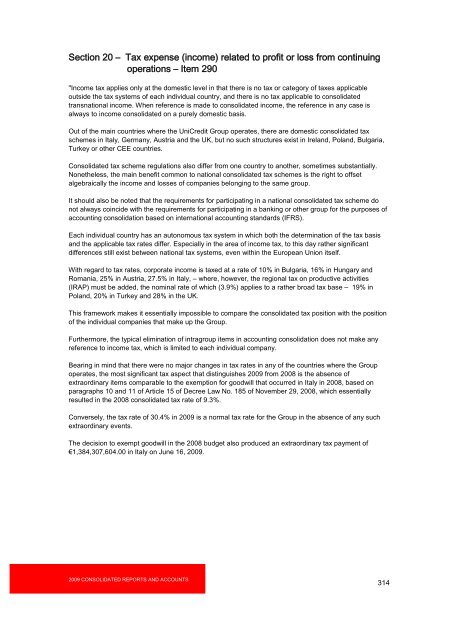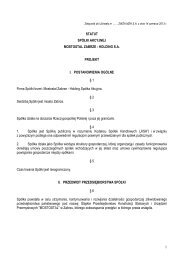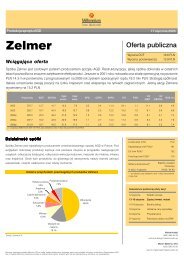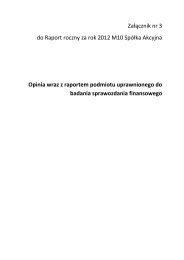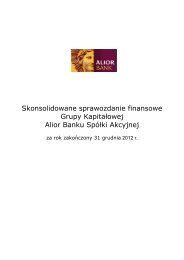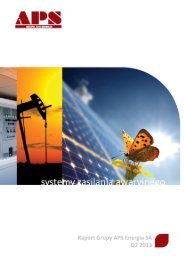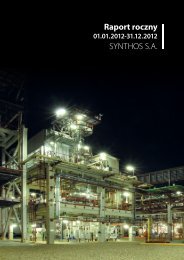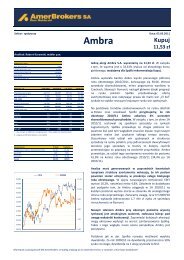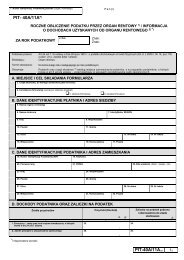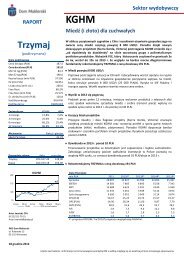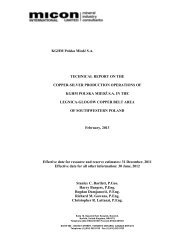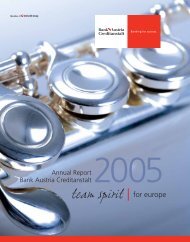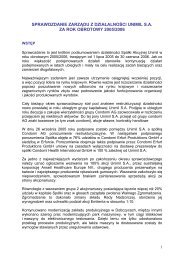- Page 1 and 2:
2009 Consolidated Reports and Accou
- Page 3 and 4:
UniCredit S.p.A Registered Office:
- Page 5:
Contents 5 Introduction 7 Board of
- Page 9 and 10:
�����������
- Page 11 and 12:
11 >> Strategy and Results Our appr
- Page 13 and 14:
REVENUES BY REGION 4 (%) 24.4 7.7 1
- Page 15 and 16:
CENTRAL AND EASTERN EUROPE UniCredi
- Page 17:
Today’s UniCredit Group is a youn
- Page 20 and 21:
�����������
- Page 22 and 23:
�����������
- Page 24 and 25:
� ����������
- Page 26:
�����������
- Page 30 and 31:
����������� I
- Page 32 and 33:
�����������
- Page 34 and 35:
�����������
- Page 36 and 37:
�����������
- Page 38 and 39:
�����������
- Page 40 and 41:
�����������
- Page 42 and 43:
�����������
- Page 44 and 45:
�����������
- Page 46 and 47:
30 20 10 0 -10 -20 Operating Profit
- Page 48 and 49:
�����������
- Page 50 and 51:
�����������
- Page 52 and 53:
�����������
- Page 54 and 55:
�����������
- Page 56 and 57:
�����������
- Page 58 and 59:
�����������
- Page 60 and 61:
With the aim of creating shareholde
- Page 62 and 63:
SRT (Semplice Risparmiare Tempo - I
- Page 64 and 65:
�����������
- Page 66 and 67:
On the mortgage loans side, the Mut
- Page 68 and 69:
�����������
- Page 70 and 71:
Breakdown of loans by country and d
- Page 72 and 73:
�������� Within the
- Page 74 and 75:
�����������
- Page 76 and 77:
The new organizational model is bei
- Page 78 and 79:
Total Financial Assets (billion €
- Page 80 and 81:
Despite the decline in profit befor
- Page 82 and 83:
customer relation and the products
- Page 84 and 85:
This decrease was offset in part by
- Page 86 and 87:
�����������
- Page 88 and 89:
�����������
- Page 90 and 91:
Key Ratios and Indicators CENTRAL E
- Page 92 and 93:
������� In the diffic
- Page 94 and 95:
�������� Despite a
- Page 96 and 97:
UniCredit Bulbank is Bulgaria's lar
- Page 98 and 99:
�����������
- Page 100 and 101:
�����������
- Page 102 and 103:
�����������
- Page 104 and 105:
�������� Workout sa
- Page 106 and 107:
�����������
- Page 108 and 109:
2009 saw a strengthening of technol
- Page 110 and 111:
�����������
- Page 112 and 113:
capital of Bank Austria Aktiengesel
- Page 114 and 115:
Following the described operation,
- Page 116 and 117:
�����������
- Page 118 and 119:
�����������
- Page 120 and 121:
�����������
- Page 122 and 123:
�����������
- Page 124 and 125:
124
- Page 126 and 127:
�����������
- Page 128 and 129:
�����������
- Page 130 and 131:
D. examine the information received
- Page 132 and 133:
�����������
- Page 134 and 135:
Deputy Vice Chairman Gutty Gianfran
- Page 136 and 137:
�����������
- Page 138 and 139:
Corporate Governance Management Com
- Page 140 and 141:
����� ������
- Page 142 and 143:
Paolo Iannone Chief Operating Offic
- Page 144 and 145:
ASSET MANAGEMENT - EXECUTIVE VICE P
- Page 146 and 147:
146
- Page 148 and 149:
148
- Page 150 and 151:
Consolidated Balance Sheet Balance
- Page 152 and 153:
Consolidated Income Statement (�
- Page 154 and 155:
Statement of Changes in Shareholder
- Page 156 and 157:
2009 CONSOLIDATED REPORTS AND ACCOU
- Page 158 and 159:
158
- Page 160 and 161:
160
- Page 162 and 163:
���� � � ����
- Page 164 and 165:
The income statement was also chang
- Page 166 and 167:
The list of subsidiaries also inclu
- Page 168 and 169:
NAME MAIN OFFICE 22 ARNO GRUNDSTUCK
- Page 170 and 171:
NAME MAIN OFFICE 95 BANK AUSTRIA LE
- Page 172 and 173:
2009 CONSOLIDATED REPORTS AND ACCOU
- Page 174 and 175:
NAME MAIN OFFICE 2009 CONSOLIDATED
- Page 176 and 177:
2009 CONSOLIDATED REPORTS AND ACCOU
- Page 178 and 179:
2009 CONSOLIDATED REPORTS AND ACCOU
- Page 180 and 181:
2009 CONSOLIDATED REPORTS AND ACCOU
- Page 182 and 183:
2009 CONSOLIDATED REPORTS AND ACCOU
- Page 184 and 185:
NAME MAIN OFFICE 2009 CONSOLIDATED
- Page 186 and 187:
2009 CONSOLIDATED REPORTS AND ACCOU
- Page 188 and 189:
2009 CONSOLIDATED REPORTS AND ACCOU
- Page 190 and 191:
2009 CONSOLIDATED REPORTS AND ACCOU
- Page 192 and 193:
Change of the consolidation method
- Page 194 and 195:
The following table shows the Entit
- Page 196 and 197:
The European Commission also transp
- Page 198 and 199:
��� � ��� ���
- Page 200 and 201:
If however the fall in the fair val
- Page 202 and 203:
The amount of the loss on impaired
- Page 204 and 205:
Allowances for unsecured loans to r
- Page 206 and 207:
transferred through profit or loss
- Page 208 and 209:
Subsequent costs are added to the c
- Page 210 and 211:
Goodwill is recognised at cost less
- Page 212 and 213:
This method distributes the cost of
- Page 214 and 215:
��� � �������
- Page 216 and 217:
The acquisition date is the date on
- Page 218 and 219:
The lessee acquires the economic be
- Page 220 and 221:
Guarantees and credit derivatives i
- Page 222 and 223:
Objective evidence that a financial
- Page 224 and 225:
��� � �������
- Page 226 and 227:
A.3.1.1 Reclassified financial asse
- Page 228 and 229:
��������� ��
- Page 230 and 231:
������ ��� ��
- Page 232 and 233:
232
- Page 234 and 235:
���� � � ����
- Page 236 and 237:
2.2 Financial assets held for tradi
- Page 238 and 239:
�������� � �
- Page 240 and 241:
�������� � �
- Page 242 and 243:
6.1 Loans and receivables with bank
- Page 244 and 245:
The following table shows the perce
- Page 246 and 247:
�������� � �
- Page 248 and 249:
NAME MAIN OFFICE 2009 CONSOLIDATED
- Page 250 and 251:
Name 2009 CONSOLIDATED REPORTS AND
- Page 252 and 253:
�������� �� �
- Page 254 and 255:
12.3 Property, plant and equipment
- Page 256 and 257:
�������� �� �
- Page 258 and 259:
Core Deposits The value of the rela
- Page 260 and 261:
In accordance with the provisions o
- Page 262 and 263:
Utility value is determined by disc
- Page 264 and 265: Non-CEE countries: Rates 2009 2010
- Page 266 and 267: Discount rates of flows The table b
- Page 268 and 269: Supplementing the sensitivity analy
- Page 270 and 271: 14.3 Deferred tax assets: annual ch
- Page 272 and 273: �������� �� �
- Page 274 and 275: �����������
- Page 276 and 277: 2.3 Breakdown of item 20 "Deposits
- Page 278 and 279: �������� � �
- Page 280 and 281: �������� � �
- Page 282 and 283: �������� �� �
- Page 284 and 285: 3. Changes to plan assets and other
- Page 286 and 287: The table below shows the breakdown
- Page 288 and 289: 15.2 Capital Stock - number of shar
- Page 290 and 291: ����� ������
- Page 292 and 293: 292
- Page 294 and 295: ���� � � ����
- Page 296 and 297: 1.4 Interest expense and similar ch
- Page 298 and 299: Fee and commission expense fell fro
- Page 300 and 301: ������� � � �
- Page 302 and 303: �������� � �
- Page 304 and 305: ������� � � �
- Page 306 and 307: ������� �� �
- Page 308 and 309: 11.5 Other administrative expenses:
- Page 310 and 311: ������� �� �
- Page 312 and 313: ������� �� �
- Page 316 and 317: ������� �� �
- Page 318 and 319: 318
- Page 320 and 321: 2009 CONSOLIDATED REPORTS AND ACCOU
- Page 322 and 323: 322
- Page 324 and 325: ���� � � ����
- Page 326 and 327: With regard to the use of the AMA (
- Page 328 and 329: During the first quarter of 2009, c
- Page 330 and 331: 2.2.1 Country risk Country risk is
- Page 332 and 333: The assessment of a counterpart’s
- Page 334 and 335: Credit risk strategies are defined
- Page 336 and 337: The current models in place within
- Page 338 and 339: �����������
- Page 340 and 341: A.1.3 Banking group - On- and off-b
- Page 342 and 343: A.2 Internal and external ratings A
- Page 344 and 345: A.3 Distribution of secured credit
- Page 346 and 347: �� ���������
- Page 348 and 349: B.3 Banking Group -Distribution of
- Page 350 and 351: The Group is also an investor, spon
- Page 352 and 353: ORIGINATOR: UniCredit S.p.A. (ex Ca
- Page 354 and 355: New transaction 2009 NAME Type of s
- Page 356 and 357: ORIGINATOR: UniCredit Family Financ
- Page 358 and 359: ORIGINATOR: UniCredit Leasing S.p.A
- Page 360 and 361: ORIGINATOR: Leasfinanz GmbH Transac
- Page 362 and 363: New transaction 2009 NAME Type of s
- Page 364 and 365:
Transactions previous periods NAME
- Page 366 and 367:
ORIGINATOR: UNICREDIT BANK AG (ex H
- Page 368 and 369:
ORIGINATOR: UNICREDIT BANK AG (ex H
- Page 370 and 371:
ORIGINATOR: UNICREDIT BANK AG (ex H
- Page 372 and 373:
ORIGINATOR: UNICREDIT BANK AG (ex H
- Page 374 and 375:
ORIGINATOR: UNICREDIT BANK AUSTRIA
- Page 376 and 377:
C.1.2 Banking Group - Exposure from
- Page 378 and 379:
( C.1.2 Banking Group - Exposure fr
- Page 380 and 381:
(C.1.3 Banking Group - Exposure res
- Page 382 and 383:
C.1.4 Banking Group - Exposure resu
- Page 384 and 385:
attachment to table C.1.8 STATEMENT
- Page 386 and 387:
Eurofinance 2000 S.r.L. - Patrimoni
- Page 388 and 389:
Geldilux TS 2005 S.A. 31/12/2009 31
- Page 390 and 391:
Geldilux TS 2008 S.A. 31/12/2009 31
- Page 392 and 393:
Trevi Finance S.p.A. 31/12/2009 31/
- Page 394 and 395:
Trevi Finance n. 3 S.r.L. 31/12/200
- Page 396 and 397:
C.3 Covered Bond Transactions Quali
- Page 398 and 399:
1. Structured Credit Products A det
- Page 400 and 401:
The transactions included under “
- Page 402 and 403:
In some circumstances purchase comp
- Page 404 and 405:
Over 55% of the structured credit p
- Page 406 and 407:
A breakdown of the Group’s gross
- Page 408 and 409:
Structured credit product exposures
- Page 410 and 411:
The following table shows the main
- Page 412 and 413:
Where it is impossible to identify
- Page 414 and 415:
2. OTC Trading Derivatives with Cus
- Page 416 and 417:
�������� � �
- Page 418 and 419:
In the same way, and in an effort t
- Page 420 and 421:
The following table gives the VaR f
- Page 422 and 423:
The main sources of interest rate r
- Page 424 and 425:
1.1 Banking portfolio: distribution
- Page 426 and 427:
1.3 Banking portfolio: distribution
- Page 428 and 429:
��� ��������
- Page 430 and 431:
A.2.2 Banking book: end of period n
- Page 432 and 433:
A.6 OTC Financial Derivatives: Regu
- Page 434 and 435:
B.2 Credit derivatives:gross positi
- Page 436 and 437:
For each 1bp shift, sensitivity is
- Page 438 and 439:
Exchange-Rate Sensitivity This simu
- Page 440 and 441:
Stress Tests Stress Tests complemen
- Page 442 and 443:
������� � � �
- Page 444 and 445:
The liquidity metrics The Group’s
- Page 446 and 447:
Additional liquidity risk measures
- Page 448 and 449:
Early Warning Indicators The Early
- Page 450 and 451:
1.3 Time breakdown by contractual r
- Page 452 and 453:
The mission of the Group Operationa
- Page 454 and 455:
�� ����� ����
- Page 456 and 457:
The Special Representative submitte
- Page 458 and 459:
Defendants include - inter alia - t
- Page 460 and 461:
On October 2, 2009, the receivershi
- Page 462 and 463:
d.d. never occurred. Therefore, Zag
- Page 464 and 465:
Shareholders’ Meeting of October
- Page 466 and 467:
The officers involved in the procee
- Page 468 and 469:
Several subsidiaries of UniCredit S
- Page 470 and 471:
Madoff In October 2009, the Souther
- Page 472 and 473:
������� � � �
- Page 474 and 475:
Internal Capital is then broken dow
- Page 476 and 477:
476
- Page 478 and 479:
���� � � ����
- Page 480 and 481:
�� ���������
- Page 482 and 483:
��� ������� �
- Page 484 and 485:
��� ������� �
- Page 486 and 487:
486
- Page 488 and 489:
���� � � ����
- Page 490 and 491:
490
- Page 492 and 493:
���� � � ����
- Page 494 and 495:
The following table sets out the im
- Page 496 and 497:
496
- Page 498 and 499:
���� � � ����
- Page 500 and 501:
Within the limits of the “Employe
- Page 502 and 503:
The ESOP 2009 is a share plan simil
- Page 504 and 505:
504
- Page 506 and 507:
���� � � ����
- Page 508 and 509:
� � ������� �
- Page 510 and 511:
� � ���������
- Page 512 and 513:
512
- Page 514 and 515:
����� � � ���
- Page 516 and 517:
CONSOLIDATED INCOME STATEMENT (�
- Page 518 and 519:
����� � � ���
- Page 520 and 521:
Annex 3 AMMS ERSATZ-KOMPLEMENTAR GM
- Page 522 and 523:
Annex 3 BALEA SOFT HAMBURG GERMANY
- Page 524 and 525:
Annex 3 BOSTON CAPITAL VENTURES V,
- Page 526 and 527:
CHARME INVESTMENTS S.C.A. LUXEMBOUR
- Page 528 and 529:
CO. WINDPARK MOSE KG Annex 3 68.48
- Page 530 and 531:
Annex 3 GUS CONSULTING GMBH VIENNA
- Page 532 and 533:
HVB LIFE SCIENCE GMBH MUNICH GERMAN
- Page 534 and 535:
Annex 3 INFORMATIONS-TECHNOLOGIE AU
- Page 536 and 537:
LIVA IMMOBILIEN LEASING VIENNA AUST
- Page 538 and 539:
Annex 3 OBEROSTERREICHISCHE UNTERNE
- Page 540 and 541:
PIONEER INVESTMENTS MUNICH GERMANY
- Page 542 and 543:
Annex 3 SANITA' - SRL IN LIQUIDAZIO
- Page 544 and 545:
TERRENO GRUNDSTUCKSVERWALTUNG GMBH
- Page 546 and 547:
Annex 3 … … UNICREDIT CORPORATE
- Page 548 and 549:
Annex 3 UNICREDIT PARTNER D.O.O ZAG
- Page 550 and 551:
Annex 3 VV IMMOBILIEN GMBH & CO. GB
- Page 552 and 553:
����� � � ���
- Page 554 and 555:
Basel 2 New international capital a
- Page 556 and 557:
Consumer ABS ABS (q.v.) in which th
- Page 558 and 559:
FINREP Document issued by the Commi
- Page 560 and 561:
IRS - Interest Rate Swap See "Swap"
- Page 562 and 563:
Operating risk The risk of losses d
- Page 564 and 565:
Securitization Transfer of a portfo
- Page 566 and 567:
566
- Page 568 and 569:
568
- Page 570:
570


